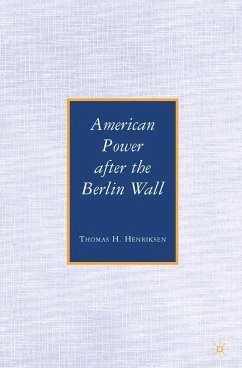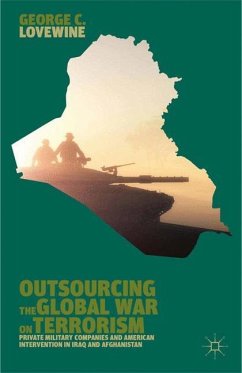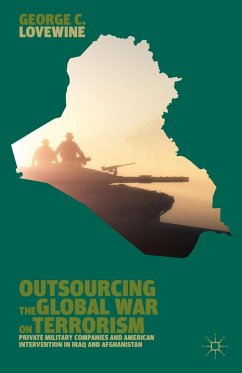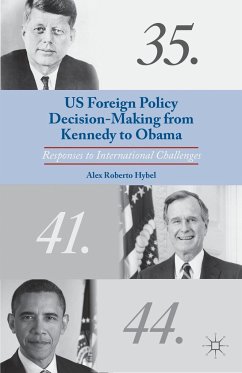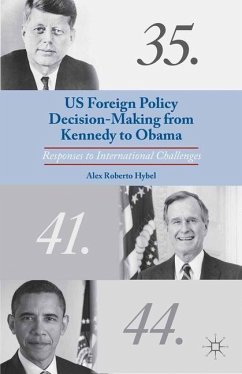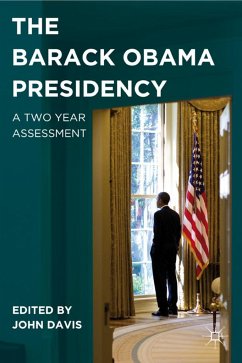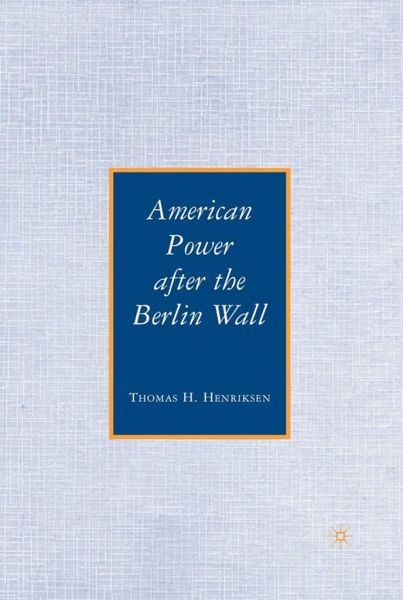
T. Henriksen
Gebundenes Buch
American Power After the Berlin Wall
Versandkostenfrei!
Versandfertig in 6-10 Tagen
Weitere Ausgaben:

PAYBACK Punkte
19 °P sammeln!





This book surveys the transformation and projection of American power abroad since the collapse of the Berlin Wall. It summarizes U.S. handling of the Soviet Union's disintegration and covers the last seventeen years of U.S. interventions and conflicts.
THOMAS HENRIKSEN is a Senior Fellow at the Hoover Institution, Stanford University, USA.
Produktdetails
- Verlag: Palgrave Macmillan / Palgrave Macmillan US / Springer Palgrave Macmillan
- Artikelnr. des Verlages: 978-0-230-60094-2
- 2007 edition
- Seitenzahl: 250
- Erscheinungstermin: 8. November 2007
- Englisch
- Abmessung: 229mm x 152mm x 19mm
- Gewicht: 554g
- ISBN-13: 9780230600942
- ISBN-10: 0230600948
- Artikelnr.: 23173536
Herstellerkennzeichnung
Libri GmbH
Europaallee 1
36244 Bad Hersfeld
gpsr@libri.de
'This informative review of post-Cold War foreign policies provides and stimulates thoughtful reflections on strategy and tactics for the future. Well written and rewarding'- George P. Shultz
'Thomas Henriksen has written a remarkably comprehensive detailed and critical survey of America's interventions across the globe since the fall of the Berlin Wall. This is an invaluable addition to the literature on American foreign policy and international relations more generally.'- Timothy Garton Ash, Professor of European Studies, University of Oxford, Senior Fellow of the Hoover Institution, Stanford University
'Thomas Henriksen has written a cogent account of the logic of American power after the Cold War, showing that there
'Thomas Henriksen has written a remarkably comprehensive detailed and critical survey of America's interventions across the globe since the fall of the Berlin Wall. This is an invaluable addition to the literature on American foreign policy and international relations more generally.'- Timothy Garton Ash, Professor of European Studies, University of Oxford, Senior Fellow of the Hoover Institution, Stanford University
'Thomas Henriksen has written a cogent account of the logic of American power after the Cold War, showing that there
Mehr anzeigen
was greater continuity than many would suspect between policies in the 1990s and in the Bush administration. It raises important questions about the uses of American power in the very different world we face today.- Francis Fukuyama author ofAmerica at the Crossroads
'Such is our preoccupation with Iraq, that we are tempted to forget just how many times the United States has intervened in the affairs of far-away countries since the end of the Cold War. In this ambitious narrative of American foreign policy since 1989, Thomas Henriksen traces the transformation of both the theory and the practice of 'regime change'. Unfashionably, but compellingly, he shows that the successes outweigh the failures - and that the worst failuresmay still be those failed states, like Rwanda, which the United States elected not to intervene in. This is the best kind of contemporary history - a book that reads like a publication from the future.'- Niall Ferguson, Laurence A. Tisch Professor of History, Harvard University, and author of Colossus: The Rise and Fall of the American Empire
'A fascinating and revealing account of American post-Cold War interventionist policies. Henriksen's work provides a solid foundation uponwhich a highly effective new grand strategy for dealing with the elusive threat of terrorism can be constructed.'- David M. Abshire, former NATO Ambassador and President, Center for the Study of the Presidency
'Such is our preoccupation with Iraq, that we are tempted to forget just how many times the United States has intervened in the affairs of far-away countries since the end of the Cold War. In this ambitious narrative of American foreign policy since 1989, Thomas Henriksen traces the transformation of both the theory and the practice of 'regime change'. Unfashionably, but compellingly, he shows that the successes outweigh the failures - and that the worst failuresmay still be those failed states, like Rwanda, which the United States elected not to intervene in. This is the best kind of contemporary history - a book that reads like a publication from the future.'- Niall Ferguson, Laurence A. Tisch Professor of History, Harvard University, and author of Colossus: The Rise and Fall of the American Empire
'A fascinating and revealing account of American post-Cold War interventionist policies. Henriksen's work provides a solid foundation uponwhich a highly effective new grand strategy for dealing with the elusive threat of terrorism can be constructed.'- David M. Abshire, former NATO Ambassador and President, Center for the Study of the Presidency
Schließen
Für dieses Produkt wurde noch keine Bewertung abgegeben. Wir würden uns sehr freuen, wenn du die erste Bewertung schreibst!
Eine Bewertung schreiben
Eine Bewertung schreiben
Andere Kunden interessierten sich für


